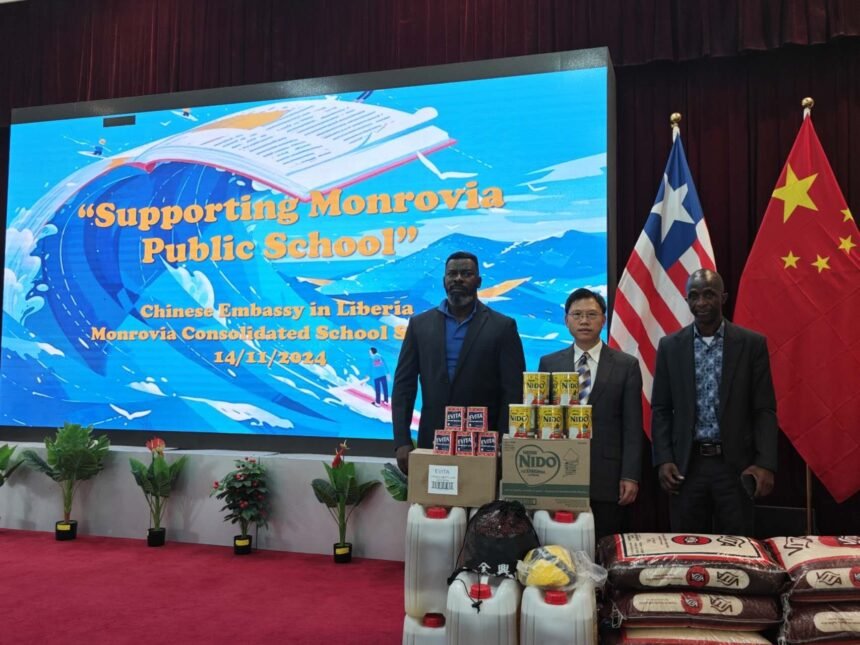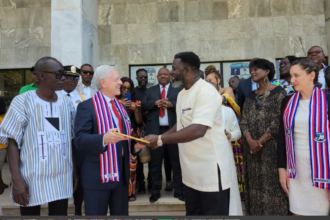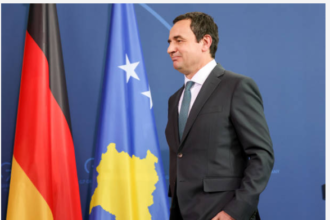Monrovia, Liberia – In adhering to President Xi Jinping promise that ŌĆ£China will provide Africa with RMB1 billion yuan in emergency food assistance, build 100,000 mu (about 6,670 hectares) of standardized agriculture demonstration areas in Africa, send 500 agricultural experts, and establish a China-Africa agricultural science and technology innovation allianceŌĆØ, the Chinese Embassy near Monrovia has already begun supporting food security efforts in Monrovia, the political and business capital of Liberia.
On Thursday, 14 November 2024, the Chinese Ambassador to Liberia, H.E. Yin Chengwu attended and gave speech at an event titled ŌĆ£Supporting Monrovia Public SchoolŌĆØ at the Chinese Embassy in Congo Town. The event which was embraced by Hon. John-Charuk S. Siafa, the Mayor of Monrovia and Hon. James A.S. Momoh, the SuperintendentŌĆéof the Monrovia Consolidated School System, among others brought together a host of Liberian students, community leaders and the media community.
His Excellency Ambassador Yin Chengwu stated, ŌĆ£the Monrovia Consolidated School SystemŌĆé(MCSS), whichŌĆéis responsible for all 25 public schools in the capital city of Monrovia, is very important. We hope that this support will encourage the [school] children to study hard, help mobilize more resources to support schools, and promote China-Liberia educational cooperation and people-to-people exchanges in support of the ARREST agendaŌĆØ.
Mayor Siafa and MCSS Superintendent Momoh thanked the government and people of China and the Chinese Embassy for supporting education and socio-economic development efforts in Liberia. Mayor Siafa said education is one of the key areas of the ARREST Agenda and that the City of Monrovia will continue to work closely with China,ŌĆéstrengthen exchanges, make good use of the supplies and spare no effortŌĆéto create a better environment for students and teachers.
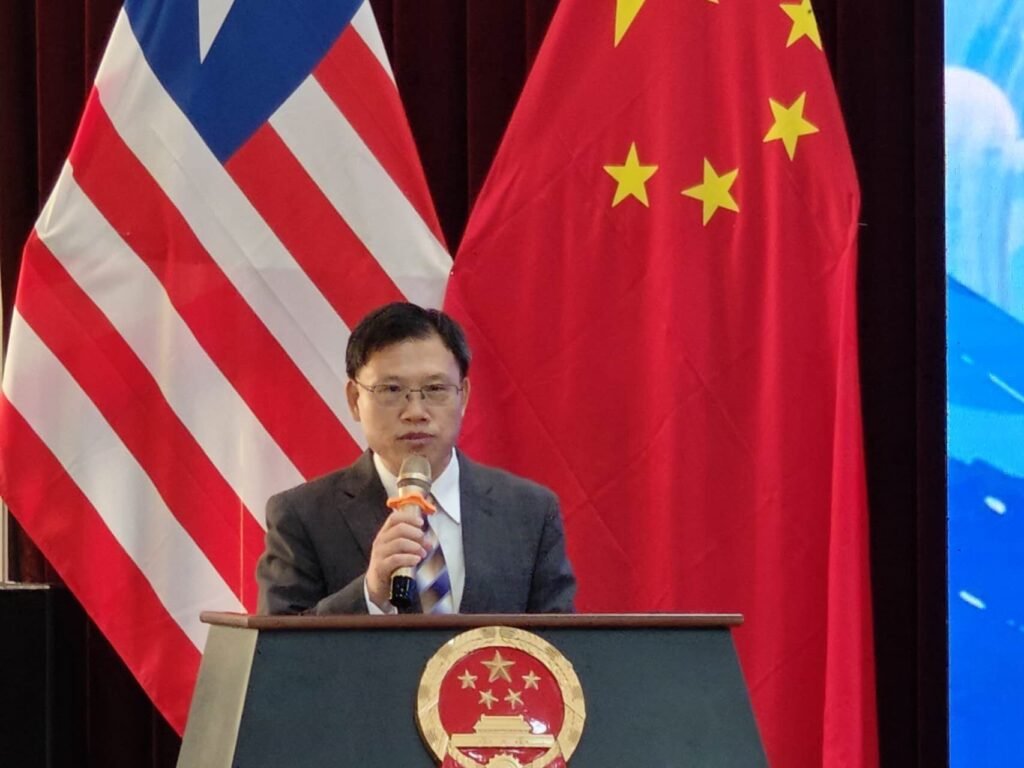
A week prior to the food donation event, on November 8th, the Chinese Embassy in Liberia and the Liberia-China Friendship OrganizationŌĆéjointlyŌĆéconducted a Seminar on the theme ŌĆ£Deepen Cooperation, Work Together for DevelopmentŌĆØ.
The seminar which was attended by more than 80 guests also included Hon. Rev. Luther J. Tarpeh, National Chairman of the ruling Unity Party, Hon. Nehker E. Gaye, Co-Chair of the Foreign Affairs Committee, House of Representatives of Liberia, Hon. Siafa G. Sheriff, President of the Liberia-China Friendship Organization , Dr. Olu Q. Menjay, President of the William V.S. Tubman University, Hon. Varney Alieu Jarsey, President of All-Africa Student Union, the teachers and students from the Confucius Institute at University of Liberia.
In recent months, China and Liberia elevated their diplomatic relationship to one of ŌĆ£Strategic PartnershipŌĆØ based on mutual respect, economic cooperation and development. This new level of cooperation continues to strengthen many Chinese investments and businesses in Liberia.
China has educated many Liberian professionals, including current Public Works Minister Roland Lafayette Giddings, Agriculture Minister J. Alexander Nuetah, Ph.D., Hon. P. Emmanuel Munyeneh, PhD., Advisor to the World Bank Group Office of the Executive Director for Africa Group One Constituency countries, and Dr. Ponnie R. Dolo, MD, Surgeon and County Health Officer, (CHO) of Nimba County, Liberia, among others.┬Ā In addition to the hundreds of students studying at various universities across China at undergraduate, graduate and post graduate levels, the Chinese government continues to provide hundreds of new academic scholarships to Liberian students and mid-level professionals in technology, agriculture and the sciences.
In a related development, on 6 November 2024, the Chinese ambassador to Liberia, Yin Chengwu also provided several items to the ŌĆ£Street Children ProjectŌĆØ of the Ministry of Gender, Children and Social Protection in the presence of Hon. Gbeme Horace-Kollie, the Minister of Gender, Children and Social Protection, Hon. Botoe Kanneh, the Chairperson of Senate Committee on Gender, Social Welfare, Women and Children Affairs and the representatives from the Ministry of Education, the Ministry of Youth and Sports, the Ministry of Labor and social organization, among others.
Businesses across Liberia depend strongly on China and Liberian businessmen and women flocked to China for trade and commerce. Many young Liberians are leaning toward China, conscious of the numerous development activities undertaken by the Chinese government and Chinese companies across the country.
Past and current Chinese development projects in Liberia include the University of LiberiaŌĆÖs Fendell Campus, the SKD Sports Complex in Paynesville, the Ministry of Health in Congo Town, the new Roberts International Airport, the RIA-Monrovia highway currently under construction, the reconstruction of the new Liberia Broadcasting System (LBS), and the EJS Ministerial Complex in Congo Town which housed the Ministry of Commerce (MOC), the Ministry of Labor (MOL), the Ministry of Education (MOE), the Ministry of Agriculture (MOA), and the Civil Service Agency (CSA) among others.
A survey from a cross section of Liberians shows that a vast number of Liberians are encouraged by Chinese engagement and relationship with Liberia, especially in the areas of trade and commerce, people to people diplomacy, education, and socio-economic development. ┬ĀSpecifically, young Liberians strongly believe that Chinese development aid and engagement with Liberia and Africa concentrate more on jobs and wealth creation, innovation, technology and industrialization, economic self-sufficiency, poverty alleviation, education and human capacity development, social harmony and peaceful co-existence.
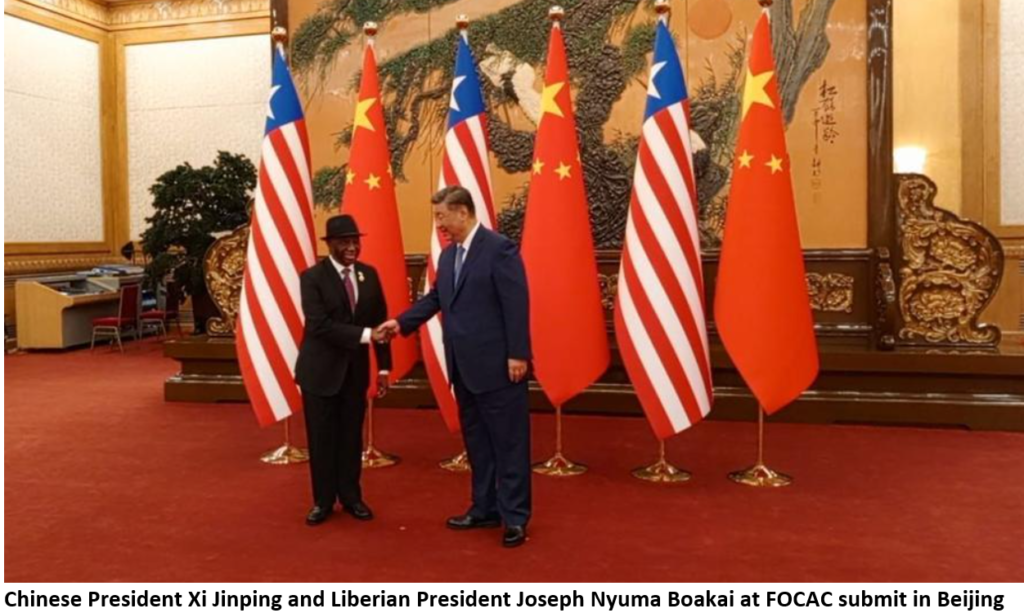
Although China’s approach to foreign aid has changed a number of times since the 1949 establishment of the PRC, often prompted by changing domestic circumstances and domestic politics, ChinaŌĆÖs social, economic and political influence across Africa continues to expand, and AfricaŌĆÖs reliance on and trust in China have been cemented in a number of ways. Liberians, for example, do more business transactions in trade and commerce with China than any country in the world, and Liberians conception of and reliance on Chinese products exceeds any country in the world.
To ease and promote more trade and commerce and public diplomacy efforts, an increasing number of young Liberians expressed interest in learning the Chinese language. Some are calling on the Chinese Embassy to establish China-Liberia students resource centers across the country to support learning in digital science, information technology and Chinese language.


